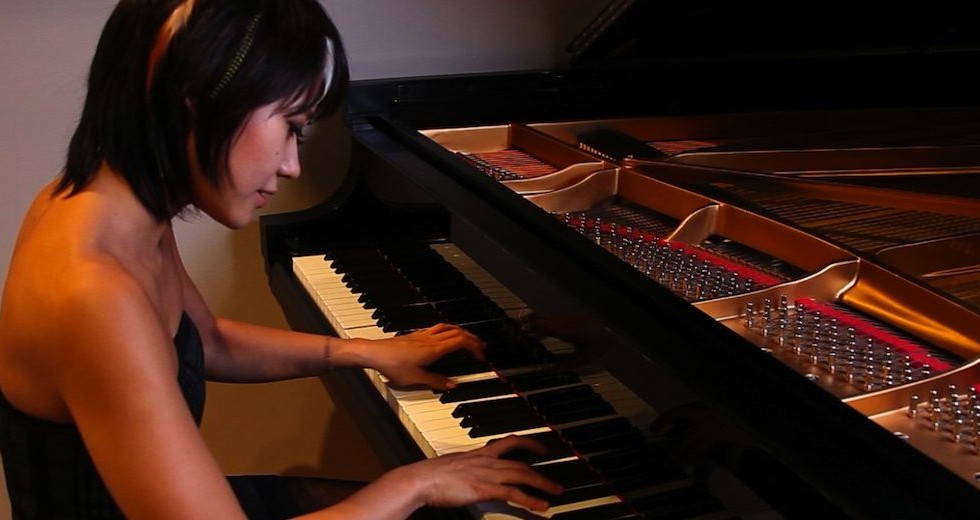
The classical world boasts an abundance of young keyboard dynamos, but few if any have risen more quickly than Chinese-born pianist Yuja Wang.
One of her earliest triumphs came in 2003, when she made her European debut with conductor David Zinman and the Tonhalle Orchestra in Zurich — the result of winning the student concerto competition a year earlier at the Aspen Music Festival when she was 15. In 2006, she made her debut with the New York Philharmonic at the Bravo! Vail Valley Music Festival in Colorado and won the Gilmore Young Artist Award. In 2009, she signed an exclusive recording contract with Deutsche Grammophon, which quickly released her first album, “Sonatas & Etudes,” and Gramophone magazine named her Classic FM’s Young Artist of the Year.
Considering all that Yuja Wang has already accomplished, it is hard to believe that she’s just 27 years old — still at the beginning of what is shaping up to be a substantial, perhaps even historic career.
Wang will perform with China’s National Centre for the Performing Arts Orchestra when it stops Nov. 2 at Orchestra Hall as part of its first North American tour. The seven-city itinerary will take chief conductor Lü Jia and the four-year-old ensemble to such prominent venues as the Kennedy Center in Washington, D.C., and National Arts Centre in Ottawa, Canada. “It’s quite a new orchestra,” Wang said via e-mail, “and I have played with them once in my home city, Beijing. It’s my first time on tour [with the ensemble] and my first time with the maestro. Most of the orchestra players are my classmates back from when I was in Beijing ages ago. So I’m very much looking forward to playing with people from my home country in my second home country.”
The keyboardist will be featured in Ravel’s Piano Concerto in G Major, which she last performed in 2004 with the San Francisco Symphony. “It’s extremely fun and colorful — a concise and precise piece,” she said. “Nothing more, nothing less. It works like a Swiss clock. But I do love the second movement, which for me, is an introspective, kaleidoscopic fantasy on a rainy, quiet day. I’m always very moved by the little world Ravel has created in this temporal snowball globe.”
Also on the program is Dvořák’s Symphony No. 8 and Wu Xing (“The Five Elements”), Suite for Orchestra, by Chen Qigang, which is described as an embodiment of composer Olivier Messiaen’s idea of “a perfect fusion of Eastern philosophical emotion and Western musical expression.”
Wang’s success is built on explosive technique and an expressive maturity that belies her young age, not to mention a magnetic stage presence that is turbo-charged by her often sexy, sometimes controversial stage apparel. “It’s just natural for me,” she said earlier this year in an interview with the Telegraph of London. “I am 26 years old, so I dress for 26. I can dress in long skirts when I am 40. Anyway, I have many different styles, I don’t only wear short. I don’t understand why I have to explain this, I just do what is natural for me.”
Now based in New York City, she was born into an artistic family in China; her mother is a dancer, and her father is a percussionist. After starting piano lessons at age 6, Wang entered Beijing’s Central Conservatory of Music just a year later. When she was 14, she moved to the United States on her own for studies with Gary Graffman at the prestigious Curtis Institute of Music in Philadelphia — a transition that she describes as the biggest turning point in her life. By the time she graduated in 2008, she was already well on her way to classical stardom, with an array of competition victories and major debuts already behind her.
Wang has performed with many of the world’s major orchestras, including the Chicago Symphony Orchestra, and has had a particularly close association with the London Symphony Orchestra. Last season, the LSO spotlighted her in its “Artist Portrait” series, which included performances of three concertos and a series of recitals, and featured her as soloist during a tour of China, with Daniel Harding conducting.
She also has worked extensively with noted violinist Leonidas Kavakos — a collaboration that continues in 2014/15 with tours in North America and Europe. “It’s very important as a human being,” she said, “to have such connections and relationships musically and to learn, grow and experience together. It also helps to delve into pieces at a deeper level, whether that happens by lots of work or serendipitously.”
With more career milestones on the horizon, including her debut with the Berlin Philharmonic next spring, Wang’s soaring career trajectory shows no signs of leveling off. “It does seem like a fast ride from the exterior,” she said, “but to be in the center of all that is happening around, the pace is rather steady.”
Kyle MacMillan, former classical music critic for the Denver Post, is a Chicago-based arts writer.